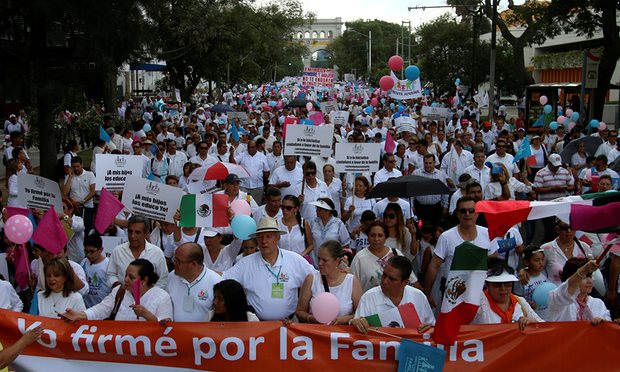Photo via The Guardian
This September, thousands of Mexican people marched through the streets in 122 cities across the country to protest a proposed constitutional reform that would legalize queer marriages, according to the LA Times.
The measure, proposed by President Enrique Peña Nieto, would give couples the right to marry regardless of gender identity or sexual orientation. Members of the protest marches see the measure as opposed to what they believe is the sanctity of marriage and the traditional family unit. The protests were largely staged by the National Front for the Family, a coalition of various religious groups and like-minded organizations. Ricardo Cano Castro, a spokesman for the group in Baja California, said it has been supported by about 1,000 groups, including schools, orphanages, and anti-abortion organizations.
The opposition to the proposal is compounded by the fact that even Peña Nieto himself is a controversial figure at the moment. The president introduced his proposal directly after his public approval ratings had fell to under 30% following several corruption scandals. “I think it hurt us a lot that someone like him got involved at that moment,” stated outreach director of the Mexican Pride Front Cristian Galarza.
These marches are only the most recent development in a legal and social battle for LGBTQ rights within the country. Currently, same-sex marriage is legal in nine of Mexico’s 31 states, as well as in Mexico City. In addition, the country’s Supreme Court passed a ruling last year that state bans on same-sex marriage are unconstitutional. The decision did not abolish existing state laws banning same-sex marriages, hence why it is still a contested issue, but allowed same-sex couples to marry by getting a personalized injunction from a federal judge and established jurisprudence for future cases, per NBC.
While some groups are protest-ing Peña Nieto’s proposed mea-sure, others have been gathering to counter-protest what they see as oppression and a violation of human rights. According to the president of Comunidad Cultural de Tijuana LGBTI, Andrés Cruz, these protests foster a sense of hate that in turn leads to physical aggression against people in queer communities.
One particular issue counter-protestors have is the involvement of the Roman Catholic Church in these protests. The Church has openly backed the cause and encouraged its followers to join in the protests, although leaders have stated that the Church was not an official organizer. Tijuana’s Ro-man Catholic archbishop, Francis-co Moreno Barrón, took place in one of these demonstrations along with his predecessor.
Afterwards, Comunidad Cultural de Tijuana LGBTI and Mexico Igualitario (Equality Mexico) submitted a complaint to the Interior Ministry accusing the arch-bishop of violating Mexico’s Constitution by participating in the protest and publicly encouraging others to do so, according to the LA Times. Mexico has strong laws stipulating separation of church and state, although the Catholic Church has a long history of influence in the political sphere, according to the Council on Hemispheric Affairs. Alex Alí Méndez, the legal director for Mexico Igualitario, has stated he is prepared to take the matter directly to the Supreme Court if authorities do not sanction the Church for their actions, which include directly op-posing the president’s legislative proposal in church publications and “fomenting hate speech.”
Conflict over this issue is likely to continue as the president tries to move his legislation through Congress and further legal battles arise. As the ideological dispute between the two sides continues to heighten, the fate of Peña Nieto’s measure and the resulting implications for the queer community remain unclear.



